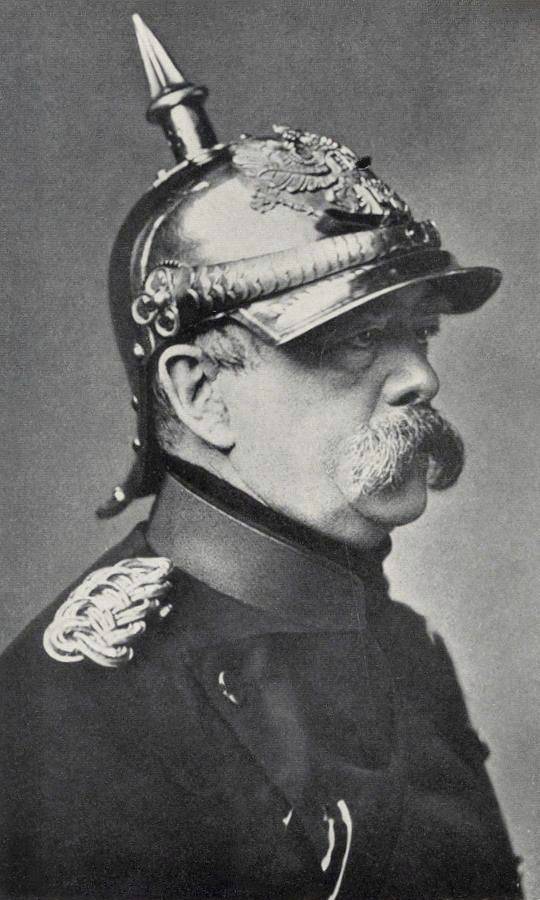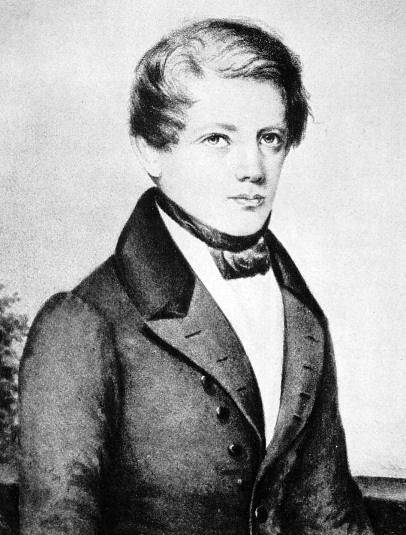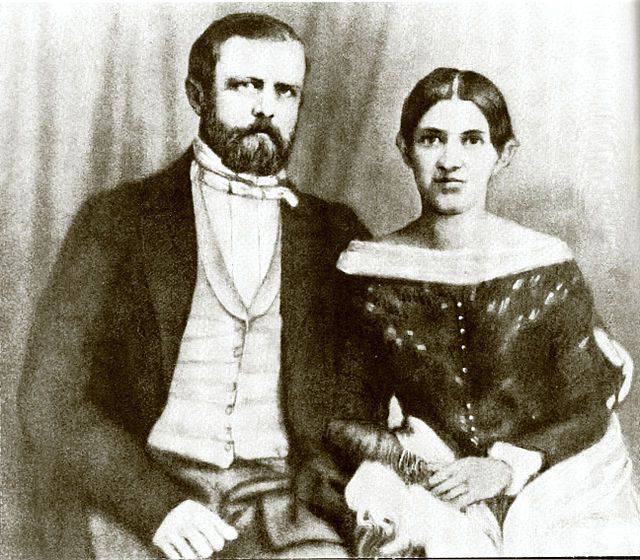"Iron Chancellor" Otto von Bismarck

200 years ago, 1 April 1815, was born the first chancellor of the German Empire, Otto von Bismarck. This German statesman entered into history as the creator of the German Empire, the "Iron Chancellor" and the actual foreign policy leader of one of the greatest European powers. Politics Bismarck made Germany the leading military and economic power of Western Europe.
Youth
Otto von Bismarck (Otto Eduard Leopold von Bismarck-Schönhausen) was born on 1 on April 1815, at Schönhausen in Brandenburg Province. Bismarck was the fourth child and the second son of a retired captain of a small landowner (they were called Prisoners in Prussia) Ferdinand von Bismarck and his wife Wilhelmina, nee Mencken. Rhode Bismarck belonged to the ancient nobility, descended from the knights, the conquerors of the Slavic lands on Labe-Elbe. The Bismarcks traced their ancestry until the reign of Charlemagne. Schonhausen Manor was in the hands of the Bismarcks family since 1562. True, the Bismarck clan could not boast of great wealth and did not belong to the largest landowners. Bismarcks have long served the rulers of Brandenburg in the peaceful and military fields.
From his father, Bismarck inherited rigidity, determination and willpower. The Bismarck family was one of the three most self-confident Brandenburg families (Schulenburg, Alvenslebena and Bismarck), and Friedrich Wilhelm I called them “nasty, recalcitrant people” in their “Political testament”. Mother was from a family of civil servants and belonged to the middle class. During this period in Germany there was a process of merging the old aristocracy and the new middle class. From Wilhelmina, Bismarck received the vitality of the mind of an educated bourgeois, delicate and sensitive soul. This made Otto von Bismarck a very extraordinary person.
Otto von Bismarck spent his childhood in the Kniphof family estate near Naugard, in Pomerania. Therefore, Bismarck loved nature and retained a sense of connection with it all his life. He received education in the private school of Plaman, the Friedrich Wilhelm gymnasium and the Zum Grauen Kloster gymnasium in Berlin. Bismarck finished his last year of school in 17 years in 1832, passing the exam for the certificate of maturity. During this period, Otto was most interested in history. In addition, he was fond of reading foreign literature, well studied French.
Then Otto entered the University of Göttingen, where he studied law. Study then attracted Otto a little. He was a strong and energetic man, and received the fame of revelers and fights. Otto participated in duels, in various tricks, visited beer houses, dragged himself behind women and played cards for money. In 1833, Otto moved to the New Metropolitan University in Berlin. During this period, Bismarck was mainly interested in, apart from the “tricks,” international politics, and his area of interest went beyond Prussia and the German Union, which limited the thinking of the overwhelming majority of young noblemen and students of that time. At the same time, Bismarck had a high conceit, he saw himself as a great man. In 1834, he wrote to a friend: "I will become either the greatest scoundrel, or the greatest converter of Prussia."
However, good abilities allowed Bismarck to successfully complete training. Before exams he attended tutors. In 1835, he received a diploma and began working in the Berlin Municipal Court. In 1837-1838 served as an official in Aachen and Potsdam. However, being an official quickly bored him. Bismarck decided to leave the public service, which went against the will of the parents, and was the result of the desire for complete independence. Bismarck was generally distinguished by full will. His career as an official did not suit him. Otto said: "My pride requires me to command, and not to execute other people's orders."

Bismarck, 1836 year
Bismarck Landowner
Since 1839, Bismarck has been engaged in arranging his estate Kniphof. During this period, Bismarck, like his father, decided to "live and die in the village." Bismarck independently studied accounting and agriculture. He proved himself to be a skillful and practical landowner, who knew well both the theory of agriculture and practice. The value of Pomeranian estates increased by more than a third in nine years, when they were managed by Bismarck. In this case, three years fell on the agricultural crisis.
However, Bismarck could not be a simple, albeit clever landowner. In it lurked a force that prevented him from living quietly in the countryside. He was still a gambler, sometimes in the evening he let down everything that he had been able to save for months of hard work. He drove a campaign with bad people, drank, and seduced the daughters of the peasants. For his violent temper, he was nicknamed "Mad Bismarck."
At the same time, Bismarck continued self-education, read the works of Hegel, Kant, Spinoza, David Friedrich Strauss and Feuerbach, and studied English literature. Byron and Shakespeare attracted Bismarck more than Goethe. English politics was very interested in Otto. Intellectually, Bismarck was an order of magnitude superior to all the landowners-junkers around him. In addition, Bismarck - a landowner participated in local self-government, was a deputy from the district, deputy landrat and a member of the landtag of the Pomerania province. Expanding the horizons of his knowledge through travel to England, France, Italy and Switzerland.
In 1843, a decisive turn in the life of Bismarck. Bismarck made acquaintance with the Pomeranian Lutherans and met the bride of his friend Moritz von Blankenburg, Maria von Thadden. The girl was seriously ill and dying. The personality of this girl, her Christian convictions, and the persistence of her character during her illness struck Otto to the core. He became a believer. This made him a staunch supporter of the king and Prussia. Service to the king meant service to God for him.
In addition, there was a radical change in his personal life. In Maria, Bismarck met Johann von Puttkamer and asked for her hand. The marriage with Johanna soon became for Bismarck his main life support, until her death in the 1894 year. The wedding took place in 1847 year. Johanna gave birth to Otto two sons and a daughter: Herbert, Wilhelm and Mary. Self-sacrificing spouse and caring mother contributed to Bismarck's political career.

Bismarck and his wife
"Mad deputy"
In the same period, Bismarck comes into politics. In 1847, he was appointed a representative of the Ostellbian knighthood in the United Landtag. This event was the beginning of Otto's political career. His work in the interregional organ of estate representation, which mainly controlled the financing of the construction of Ostban (Berlin-Königsberg road), mainly consisted of making critical speeches against liberals who tried to form a real parliament. Among conservatives, Bismarck enjoyed a reputation as an active defender of their interests, who is able, without particularly delving into substantive argumentation, to arrange “fireworks”, divert attention from the subject of the dispute, and arouse minds.
By opposing the liberals, Otto von Bismarck contributed to the organization of various political movements and newspapers, including the New Prussian Newspaper. Otto became a member of the lower house of Prussia in 1849, and the Erfurt Parliament in 1850. Bismarck was then an opponent of the nationalist aspirations of the German bourgeoisie. Otto von Bismarck saw in the revolution only the "greed of the have-nots". His main task Bismarck considered the need to point out the historical role of Prussia and the nobility as the main driving force of the monarchy, and the protection of the existing socio-political order. The political and social consequences of the 1848 revolution of the year, which covered a large part of Western Europe, had a profound impact on Bismarck and strengthened his monarchical views. In March, 1848 Mr. Bismarck was even going to march to Berlin with his peasants in order to end the revolution. Bismarck occupied the far right, being more radical than even the monarch.
In this revolutionary time, Bismarck acted as an ardent defender of the monarchy, Prussia, and Prussian youth. In 1850, Bismarck spoke out against the federation of German states (with or without the Austrian Empire), since he believed that this union would only strengthen the revolutionary forces. After that, King Friedrich Wilhelm IV, on the recommendation of Adjutant General King Leopold von Gerlach (he was the leader of the ultra-right group surrounded by the monarch), appointed Bismarck as Prussia envoy to the German Union, in the Bundestag sitting in Frankfurt. At the same time, Bismarck also remained a member of the Prussian Landtag. The Prussian conservative was arguing so fiercely with the liberals about the constitution that he even made a duel with one of their leaders, Georg von Wienke.
Thus, in 36 years, Bismarck occupied the most important diplomatic post that the Prussian king could offer. After a short stay in Frankfurt, Bismarck realized that the further unification of Austria and Prussia within the framework of the German Union was no longer possible. The strategy of the Austrian Chancellor Metternich, who is trying to turn Prussia into a junior partner of the Habsburg Empire in the framework of Central Europe, led by Vienna, failed. The confrontation between Prussia and Austria in Germany during the revolution acquired a clear character. Then Bismarck began to conclude that war with the Austrian Empire was inevitable. Only war can decide the future of Germany.
During the Eastern crisis, even before the beginning of the Crimean War, Bismarck, in a letter to Prime Minister Manteuffel, expressed concern that Prussia’s policy, which fluctuates between England and Russia, in case of evasion towards Austria, England’s ally, could lead to war with Russia. “I would be careful,” Otto von Bismarck noted, “in search of protection from the storm, to land our elegant and durable frigate to the old, worm-fed warship of Austria.” He proposed to use this crisis wisely in the interests of Prussia, and not of England and Austria.
After the completion of the Eastern (Crimean) War, Bismarck noted the collapse of the union of the three Eastern powers - Austria, Prussia and Russia - based on the principles of conservatism. Bismarck saw that the gap between Russia and Austria would last for a long time and that Russia would seek an alliance with France. Prussia, in his opinion, should have avoided possible opposing alliances, and not allow Austria or England to engage her in an anti-Russian alliance. Bismarck increasingly held anti-British positions, expressing his distrust of the possibility of a productive union with England. Otto von Bismarck noted: "The security of the island location of England makes it easier for her to abandon her continental ally and allows her to be abandoned, depending on the interests of British politics." Austria, if it becomes an ally of Prussia, will try to solve its problems at the expense of Berlin. In addition, Germany remained an area of confrontation between Austria and Prussia. As Bismarck wrote: "According to the policy of Vienna, Germany is too small for the two of us ... we both cultivate the same arable land ...". Bismarck confirmed his earlier conclusion that Prussia would have to fight against Austria.
As Bismarck perfected his knowledge of diplomacy and the art of public administration, he increasingly moved away from ultraconservatives. In 1855 and 1857 Bismarck paid reconnaissance visits to the French Emperor Napoleon III and came to the conclusion that this was a less significant and dangerous politician than Prussian conservatives believed. Bismarck broke with the entourage of Gerlach. As the future "Iron Chancellor" said: "We must operate with realities, not fictions." Bismarck believed that Prussia needed a temporary alliance with France to neutralize Austria. According to Otto, Napoleon III de facto suppressed the revolution in France and became the legitimate ruler. The threat to other states with the help of the revolution is now "the favorite occupation of England."
As a result, Bismarck was accused of treason with the principles of conservatism and Bonapartism. Bismarck responded to the enemies that “... my ideal politician is impartiality, independence in making decisions of likes or dislikes towards foreign countries and their rulers.” Bismarck saw that stability in Europe was threatened more by England, with its parliamentarism and democratization, than by Bonapartism in France.
Political "study"
In 1858, King Frederick Wilhelm IV’s brother, who suffered from a mental disorder, Prince William, became regent. As a result, the political course of Berlin has changed. The reaction period was completed and Wilhelm proclaimed the “New Era”, defiantly appointing a liberal government. Bismarck’s ability to influence Prussia’s policy plummeted. Bismarck was recalled from the Frankfurt post and, as he himself noted with bitterness, was sent "to the cold on the Neva." Otto von Bismarck became a messenger in Petersburg.
The Petersburg experience greatly helped Bismarck, as the future German chancellor. Bismarck became close with Russian Foreign Minister Prince Gorchakov. Later, Gorchakov will assist Bismarck in isolating, first Austria and then France, which will make Germany the leading power in Western Europe. In St. Petersburg, Bismarck will understand that Russia still holds key positions in Europe, despite the defeat in the Eastern War. Bismarck studied the balance of political forces in the king’s entourage and in the capital’s “light of the world” well, and realized that Prussia’s position in Europe gives an excellent chance, which is very rare. Prussia could unite Germany, becoming its political and military core.
The activities of Bismarck in St. Petersburg was interrupted due to a serious illness. About a year Bismarck was treated in Germany. He finally broke with the extreme conservatives. In 1861 and 1862 Bismarck twice represented Wilhelm as a candidate for the post of Minister of Foreign Affairs. Bismarck outlined his view on the possibility of uniting "non-Austrian Germany." However, William did not dare to appoint Bismarck Minister, as he made a demonic impression on him. As Bismarck himself wrote: "He found me more fanatical than I really was."
But at the insistence of the Minister of War, von Roon, who patronized Bismarck, the king decided to send Bismarck "to study" to Paris and London. In 1862, Bismarck was sent as an envoy to Paris, but did not stay there for long.
To be continued ...
Information